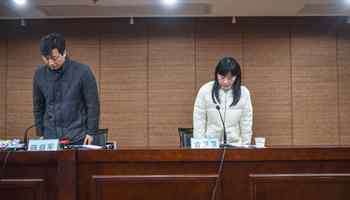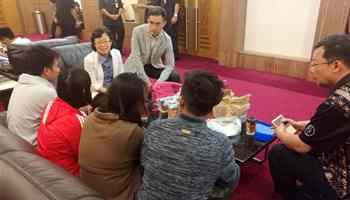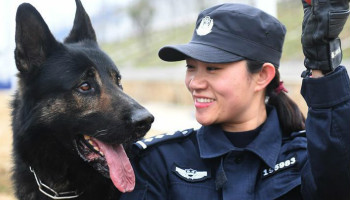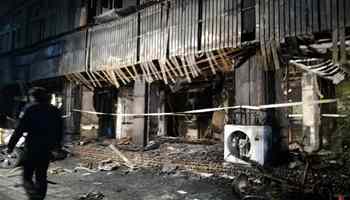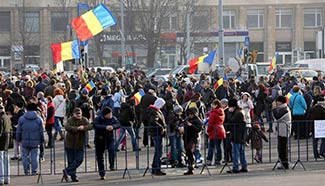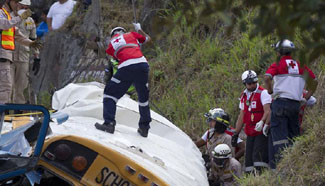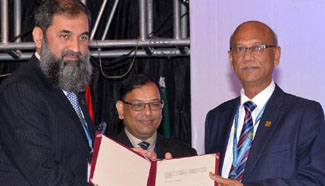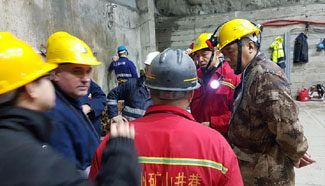by Will Koulouris
SYDNEY, Feb. 6 (Xinhua) -- For as long as there has been agriculture in Australia, after the European settlement in 1788, foreign investment has remained crucial to ensuring the viability of the industry.
The need for foreign investment has also brought with it those, who either politically or via personal principle, are vehemently opposed to what they view as non-Australians coming to take ownership of their lands, and as such legislative measures have been established to oversee overseas investors.
Whether it was the foreign exchange control mechanism, or the Foreign Investment Review Board (FIRB) established in 1976, these instruments have been used as a political tool, former Australian Federal Trade Minister Andrew Robb told Xinhua, saying foreign investment regulation has always been affected by xenophobic elements.
"The irony is, when FIRB was set up, it was a decade or so after the war, and it was in response to community concern that the Americans were buying too much of our manufacturing sector," Robb said.
"So here was the United States who in many respects saved us during the war, and was a great alliance partner, the same phrases and opposition we are hearing now out of parts of Australia, were being said."
Robb likened the present to the past, explaining that there was also similar outcry when Japan began to invest in Australia in the late 1970's.
"You had the same intense opposition from certain parts, saying the same sorts of slogans, which are often quite offensive to others, but of course now no-one gives it a second thought," Robb said.
"So China happens to be the latest wave of investment. We've witnessed this with every wave of investment, whether it's from the U.S., Japan, or earlier waves of investment into Australia."
Doug Ferguson, partner in charge of Asia and international markets at KPMG told Xinhua that the onus is on leaders to change the mindset of those who would be swayed by populist political elements.
"The challenge is for our leaders in both business and government, to really explain the benefits of global free trade, because if we don't do that successfully there's a very large number of Australians that are open to listening to the sort of rhetoric that those political elements that are rising can share," Ferguson said.
"It's really important to have some good case studies where companies that have embraced free trade, have profited, and then enabled them to invest more back into the Australian economy, creating more jobs, paying more tax."
In 2015, Australian Senator Jacquie Lambie strongly opposed Chinese investors taking over Van Diemens Land Company, a dairy business based in Tasmania.
In her boisterous opposition, Lambie proclaimed that her intent was to protect the food security of Australia, while also singling out China as a nation she would not like Australia doing business with, despite the fact that China is Australia's largest trading partner.
"It's wrong for the Liberal government and their FIRB to treat companies from NZ, Japan or Korea the same as companies from China." Lambie said.
Yet, the VDL sale to Moon Lake Investments was a resounding success, with the company planning to export 10 million liters of milk direct to the Chinese market in 2017.
"This is a really exciting opportunity using our logistics and ability to take Tasmania to the world. It's a neat fit," Tasmanian Premier Will Hodgman said in October.
"We couldn't imagine this just a few years ago."
With the move to pull out of the Trans-Pacific Partnership made by U.S. President Trump, there has never been a more critical time for Australian agriculture, so heavily dependent on free flowing capital and global markets.
With much of the world shifting towards isolationism, Robb made it clear that the Asian markets are crucial to the longevity and success of the agricultural sector in Australia.
"The developed world is going protectionist, or much of it in Europe or the U.S., and the Asian world is liberalising. So it's no surprise that the major contributor to world growth, with over 70 percent of world growth, is coming out of the Asian region," Robb said.
"Australia has got a lot of economic activity and opportunity on our doorstep, in our backyard, in Asia. We are very well placed to take advantage."
The trade opportunities must go both ways to ensure robust relationships, and the Regional
Comprehensive Economic Partnership (RCEP) has the potential to open doors, doors that Robb says Australia must enter.
"Australia needs to not only provide the goods, agriculture and other goods, resources to our region, but we need to go and invest with our services, we need to put people on the ground," Robb said.
"Investing in China, in India, in Indonesia, in Vietnam, and taking our world class services, we should be looking to take those into the region in many cases through joint ventures with the locals,"
"But if we don't put down roots now in the region, we miss out in the future, or when all these countries go towards the developed stages."
Ferguson agrees, and says the RCEP is "now the greatest opportunity for Australia."
"The failure of TPP acts as a catalyst to amplify the importance of RCEP, and I know that the government is working very hard to ensure that we are well positioned within that trade agreement." Ferguson said.
For foreign investment to help farmers, and the agriculture sector, more needs to be done in terms of educating the public, highlighting not only the fact that Australian farming is highly dependent on exports, but foreign capital also fills the gap between investment and savings in agriculture.
Hannah Bretherton, project coordinator at China Matters, says Australia has to accept the need for capital from overseas.
"In Australia, we have a capital shortfall of about 850 billion, just in agriculture. We need foreign investment, there's no getting around that." Bretherton said.
Ferguson says the capital flow is necessary, as Australian agriculture has a high cost of production, and high operating costs, and that investment can help to fix that, especially in terms of better training.
"We need to improve the training and educational system for agriculture students, we need a lot more of them coming through," Ferguson said.
"We need to be adaptive and innovators in terms of agriculture technology."
Bretherton agrees that capital spending being used on training is of high importance, but says that investment also comes in the form of non-monetary means.
"We have people that come over from China after 20 years and find they can't get work here because they are viewed as being out of the game, and yet they have so much to offer, especially in terms of insight to navigate the Asian markets," Bretherton said.
"So we do need to do a lot more to harness the cross-cultural, and cross-country connections that we already have, and then incentivise people to build them and strengthen them."
But the simple, unavoidable fact, according to Robb, is that as a nation Australia has always depended on overseas investors to grow.
"Australia has never had a population large enough to save sufficient money to fund the enormous opportunities that exist in Australia. So we've always relied on foreign investment, and often people have been opposed to it all the way through," Robb said.
"Australia now is one of the wealthiest countries in the world because foreign investment has been allowed to come in and help Australia develop its potential."
"And that's the message every Australian needs to understand."




